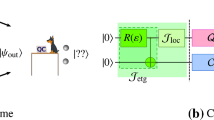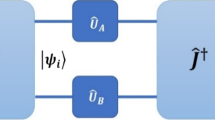Abstract
Repeated quantum game theory addresses long-term relations among players who choose quantum strategies. In the conventional quantum game theory, single-round quantum games or at most finitely repeated games have been widely studied; however, less is known for infinitely repeated quantum games. Investigating infinitely repeated games is crucial since finitely repeated games do not much differ from single-round games. In this work, we establish the concept of general repeated quantum games and show the Quantum Folk Theorem, which claims that by iterating a game one can find an equilibrium strategy of the game and receive reward that is not obtained by a Nash equilibrium of the corresponding single-round quantum game. A significant difference between repeated quantum prisoner’s dilemma and repeated classical prisoner’s dilemma is that the classical Pareto optimal solution is not always an equilibrium of the repeated quantum game when entanglement is sufficiently strong. When entanglement is sufficiently strong and reward is small, mutual cooperation cannot be an equilibrium of the repeated quantum game. In addition, we present several concrete equilibrium strategies of the repeated quantum prisoner’s dilemma.














Similar content being viewed by others
Notes
The most general definition of a single-qubit mixed strategy U is given as
$$\begin{aligned} U=\int _{U(2)} p(g)g \mathrm{d}\mu (g), \end{aligned}$$(2.6)where \(\mathrm{d}\mu \) is a Haar measure on U(2) and p(g) is non-negative and satisfies \(\int _{U(2)} p(g)\mathrm{d}\mu (g)=1\). Throughout this article, we intend to explore mixed strategies based on Def. 2.2.
References
Ikeda, K.: Foundation of quantum optimal transport and applications. Quantum Inf. Process. 19, 25 (2020). https://doi.org/10.1007/s11128-019-2519-8
Ikeda, K.: Quantum contracts between schrödinger and a cat. Quantum Inf. Process. 20, 313 (2021). https://doi.org/10.1007/s11128-021-03252-4
Chowdhury, S.N., Kundu, S., Perc, M., Ghosh, D.: Complex evolutionary dynamics due to punishment and free space in ecological multigames. Proc. R. Soc. A Math. Phys. Eng. Sci. 477, 20210397 (2021). https://doi.org/10.1098/rspa.2021.0397
Ikeda, K., Shoto, A.: Theory of Quantum Games and Quantum Economic Behavior. saps e-prints (2020) saps:2010.14098 [arXiv:2010.14098]
Nash, J.F.: Equilibrium points in n-person games. Proc. Natl. Acad. Sci. 36, 48 (1950). https://doi.org/10.1073/pnas.36.1.48
Eisert, J., Wilkens, M., Lewenstein, M.: Quantum games and quantum strategies. Phys. Rev. Lett. 83, 3077 (1999). https://doi.org/10.1103/PhysRevLett.83.3077
Meyer, D.A.: Quantum strategies. Phys. Rev. Lett. 82, 1052 (1999). https://doi.org/10.1103/PhysRevLett.82.1052
Li, Q., Chen, M., Perc, M., Iqbal, A., Abbott, D.: Effects of adaptive degrees of trust on coevolution of quantum strategies on scale-free networks. Sci. Rep. 3 (2013) 2949 EP
Li, Q., Iqbal, A., Perc, M., Chen, M., Abbott, D.: Coevolution of quantum and classical strategies on evolving random networks. PLoS ONE 8, e68423 (2013). https://doi.org/10.1371/journal.pone.0068423
Khan, F.S., Solmeyer, N., Balu, R., Humble, T.: Quantum games: a review of the history, current state, and interpretation. Quantum Inf. Process. 17, 309 (2018)
Iqbal, A., Toor, A.H.: Quantum repeated games. Phys. Lett. A 300, 541 (2002). https://doi.org/10.1016/S0375-9601(02)00893-9
Frackiewicz, P.: Quantum repeated games revisited. J. Phys. A Math. Gen. (2012). https://doi.org/10.1088/1751-8113/45/8/085307
Abreu, D.: On the theory of infinitely repeated games with discounting. Econometrica 56, 383 (1988)
Fudenberg, D., Maskin, E.: The folk theorem in repeated games with discounting or with incomplete information. Econometrica 54, 533 (1986)
Morgenstern, O., Von Neumann, J.: Theory of Games and Economic Behavior. Princeton University Press, Princeton (1953)
Lloyd, S., Weedbrook, C.: Quantum generative adversarial learning. Phys. Rev. Lett. 121, 040502 (2018). https://doi.org/10.1103/PhysRevLett.121.040502
Khan, F.S., Humble, T.S.: Nash embedding and equilibrium in pure quantum states. In: International Workshop on Quantum Technology and Optimization Problems. Springer, pp. 51–62 (2019)
Acknowledgements
This work was supported by PIMS Postdoctoral Fellowship Award (K. I.)
Author information
Authors and Affiliations
Contributions
K.I. designed and performed the research, interpreted the results, and wrote the paper. S.A. helped with the calculations.
Additional information
Publisher's Note
Springer Nature remains neutral with regard to jurisdictional claims in published maps and institutional affiliations.
Rights and permissions
About this article
Cite this article
Ikeda, K., Aoki, S. Infinitely repeated quantum games and strategic efficiency. Quantum Inf Process 20, 387 (2021). https://doi.org/10.1007/s11128-021-03295-7
Received:
Accepted:
Published:
DOI: https://doi.org/10.1007/s11128-021-03295-7




